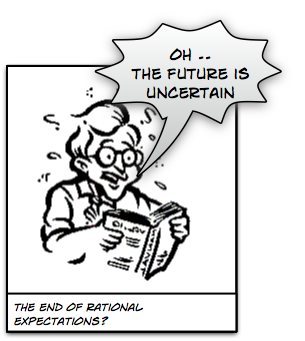An interview with Tom Sargent [embedded content] I especially love the way this Nobel laureate “explains” rational explanations: There are so many people out there, and it is so difficult to know how each one of them thinks about the future. So let’s just assume they think the same. Problem solved. And that absolute nonsense reasoning rendered this guy a ‘Nobel prize’ in economics! The tiny little problem that there is no hard empirical evidence that verifies rational expectations models obviously doesn’t bother rational expectations überpriest Thomas Sargent. He goes on defending the epistemological status of the rational expectations hypothesis arguing that since it “focuses on outcomes and does not pretend to have behavioral content,” it has proved to
Topics:
Lars Pålsson Syll considers the following as important: Economics
This could be interesting, too:
Lars Pålsson Syll writes Schuldenbremse bye bye
Lars Pålsson Syll writes What’s wrong with economics — a primer
Lars Pålsson Syll writes Krigskeynesianismens återkomst
Lars Pålsson Syll writes Finding Eigenvalues and Eigenvectors (student stuff)
An interview with Tom Sargent
I especially love the way this Nobel laureate “explains” rational explanations:
There are so many people out there, and it is so difficult to know how each one of them thinks about the future. So let’s just assume they think the same. Problem solved.
And that absolute nonsense reasoning rendered this guy a ‘Nobel prize’ in economics!
The tiny little problem that there is no hard empirical evidence that verifies rational expectations models obviously doesn’t bother rational expectations überpriest Thomas Sargent. He goes on defending the epistemological status of the rational expectations hypothesis arguing that since it “focuses on outcomes and does not pretend to have behavioral content,” it has proved to be “a powerful tool for making precise statements.”
Yeah, “precise” and “rigorous” — but what good does that do when they are all wrong?
As Sargent says in the interview, the concept of rational expectations was first developed by John Muth in an Econometrica article in 1961 — Rational expectations and the theory of price movements — and later — from the 1970s and onward — applied to macroeconomics. Muth framed his rational expectations hypothesis (REH) in terms of probability distributions:
Expectations of firms (or, more generally, the subjective probability distribution of outcomes) tend to be distributed, for the same information set, about the prediction of the theory (or the “objective” probability distributions of outcomes).
But Muth was also very open with the non-descriptive character of his concept:
The hypothesis of rational expectations] does not assert that the scratch work of entrepreneurs resembles the system of equations in any way; nor does it state that predictions of entrepreneurs are perfect or that their expectations are all the same.
To Muth, its main usefulness was its generality and ability to be applicable to all sorts of situations irrespective of the concrete and contingent circumstances at hand.
Muth’s concept was later picked up by New Classical Macroeconomics, where it soon became the dominant model-assumption and has continued to be a standard assumption made in many neoclassical (macro)economic models – most notably in the fields of (real) business cycles and finance (being a cornerstone of the “efficient market hypothesis”).
REH basically says that people on the average hold expectations that will be fulfilled. This makes the economist’s analysis enormously simplistic since it means that the model used by the economist is the same as the one people use to make decisions and forecasts of the future. 
But in the real world, it is not possible to just assume — as does Sargent — that we know the exact probability distribution of future events. On the contrary. We can’t even assume that probability distributions are the right way to characterize, understand or explain acts and decisions made under uncertainty. When we simply do not know, when we have not got a clue, when genuine uncertainty prevails, REH simply is not “reasonable.” In those circumstances, it is not a useful assumption, since, under those circumstances, the future is not like the past, and henceforth, we cannot use the same probability distribution – if it at all exists – to describe both the past and future.
If we want to have anything of interest to say on real economies, financial crisis, and the decisions and choices real people make, it is high time to replace the rational expectations hypothesis with more relevant and realistic assumptions concerning economic agents and their expectations. ‘Rational expectations’ — paraphrasing Nichols Kaldor — is a barren and irrelevant apparatus of thought to deal with the way real-world people make decisions and act. It sure is “thoroughly misleading and pretty useless” and also one of the major obstacles to developing economics as a science.
Any model assumption — such as ‘rational expectations’ — that doesn’t pass the real world Smell Test is just silly nonsense on stilts.
Suppose someone sits down where you are sitting right now and announces to me that he is Napoleon Bonaparte. The last thing I want to do with him is to get involved in a technical discussion of cavalry tactics at the battle of Austerlitz. If I do that, I’m getting tacitly drawn into the game that he is Napoleon. Now, Bob Lucas and Tom Sargent like nothing better than to get drawn into technical discussions, because then you have tacitly gone along with their fundamental assumptions; your attention is attracted away from the basic weakness of the whole story. Since I find that fundamental framework ludicrous, I respond by treating it as ludicrous – that is, by laughing at it – so as not to fall into the trap of taking it seriously and passing on to matters of technique.
